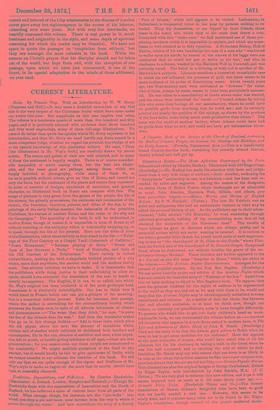Traditions, Superstitions, and Folk-Lore. By Charles Hardwicke. (Manchester: A. Ireland.
London : Simpkin and Marshall.)—Though Mr. Hardwicke deals with the superstition of Lancashire and the North of England, he has collected a mass of carious facts from all parts of the world. What strange things, for instance, are the "pin-wells" into which you drop a pin and learn your fortune from the way in which it passes through the water! And how marvellous the story of a Scotch
" Pool of Siloam," which still appears to be visited. Lochmanur, in Sutherland, is frequented twice in the year by persons seeking to be healed. They dip themselves, or are dipped by their friends, three times in the water, into which they at the same time throw a coin. Connected with this " water-care " we find mentioned one of those per- plexing incidents which it is impossible to explain, and which are some- times so well attested as to defy rejection. A Protestant Bishop, Hall of Exeter, relates of his own knowledge the case of a man who " was forced to walks upon his hands, by reason of the sinews of his leggs were see contracted that ho could not goe or walke on his feet," and who, in obedience to a dream, washed in the Maddorn Well in Cornwall, and was perfectly cured. The belief in a divining or wish-rod is another of Mr. Hsrdwicke'a subjects. Linnnus mentions a somewhat remarkable case in which the rod indicated the presence of gold, but there seems to be more evidence of its power of discovering water. About twenty years ago, two West-country men wore celebrated as "dowsers " for water. One of them, Adams by name, seems to have been particularly success- ful. He was taken to a manufactory at Leeds where water was wanted, and the owner thus described the result :—"I tested Adams by taking him over some deep borings at our manufactory, where he could have no possible guide from anything that ho could see ; and he certainly pointed out nearly the position of the springs, as shown by the produce of the bore-holes, some being much more productive than others." The same was the result at another factory, where Adams could have had no guide from what ho saw, and could not have got information other- wise.


































 Previous page
Previous page